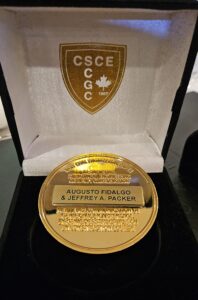
Four members of our CivMin community are among the 14 members elected as Fellow, and the authors of four technical papers recognized, by the Canadian Society for Civil Engineering (CSCE).
Professor Khandker Nurul Habib, Professor Jeffrey Packer, alumnus Dr. Augusto Fidalgo (CivMin PhD 2T3) and Henri Monette (CivMin PhD student) are among those select few to receive acknowledgment from the CSCE. “On behalf of the Board of Directors and all members of the Society, I extend my heart‐felt congratulations to all awards recipients,” says CSCE President Bing Chen at the Annual Conference in Winnipeg, the evening of Friday, May 30.

Professor Khandker Nurul Habib was elected a Fellow in recognition of his long and impactful career.
Professor Jeffrey Packer and Augusto Fidalgo (CivMin PhD 2T3) won the Casimir Gzowski Medal, which is awarded annually for the best civil engineering paper in surveying, structural engineering or heavy construction. They were deemed to have the best civil engineering paper in surveying, structural engineering or heavy construction with their submission “Bolted end‐plate tube connections subject to tension and bending” (doi:10.1139/cjce‐2023‐0207).
Henri Monette (CivMin PhD student) won the Donald Jamieson Fellowship, which was established in Jamieson’s honour in 1987. The Fellowship is awarded annually to candidates pursuing full‐time graduate studies in structural engineering at a Canadian University.
Below are the citations published by the CSCE:
KHANDKER NURUL HABIB – FELLOWS OF THE CANADIAN SOCIETY FOR CIVIL ENGINEERING 2025
Professor Khandker Nurul Habib is a leading expert in transportation systems engineering, currently a Full Professor in the Department of Civil & Mineral Engineering at the University of Toronto. He earned his PhD in Civil Engineering in 2007 from the University of Toronto. His BSc (Civil Engineering) and MSc (Civil and Transportation Engineering) are from Bangladesh University of Engineering and Technology. He began his academic career in 2008 at the University of Alberta, where he played a key role in revitalizing the graduate program in transportation engineering. In 2010, he returned to the University of Toronto, leading the Travel Demand Modelling Group (TDMG), focusing on sustainable transportation planning, demand modelling, and advanced travel survey methodologies.
Dr. Habib is a pioneer in agent‐based microsimulation activity‐based travel demand models (e.g., CUSTOM) and innovative travel data collection technologies (e.g., TRAISI‐Move). His groundbreaking contributions have earned him prestigious accolades, including the Eric Pas Award from the International Association for Travel Behaviour Research, the Pyke Johnson Award from the Transportation Research Board, and the Sanford Fleming Award from the Canadian Society for Civil Engineering. In 2021, he was appointed Chair of the Transportation Research Board’s Standing Committee on Traveller Behaviour and Values. By May 2025, Dr. Habib published 200 peer‐reviewed journal papers, presented over 300 papers at international conferences, and supervised 26 PhD and 67 master’s thesis students. Recognized globally for his research impact, in 2024 he was ranked 209th in the world’s 2% scientists list (by Scopus, Elsevier) in Transportation and Logistics from 1960 to 2023.

AUGUSTO FIDALGO AND JEFFREY A. PACKER – CASIMIR GZOWSKI MEDAL
As superintendent of public works of the Province of Canada, Colonel Sir Casimir Stanislaus Gzowski (1813‐1898) was responsible for improving waterways and canals and constructing roads, harbours and bridges. Later, he was involved in railroad construction and the design and construction of the international bridge at Fort Erie. A founder of the CSCE in 1887, he served as president from 1889 to 1891. Established by Sir Casimir in 1890, the Casimir Gzowski Medal is awarded annually for the best civil engineering paper in surveying, structural engineering or heavy construction.
The Casimir Gzowksi Medal for 2024 (presented in 2025) is awarded to Augusto Fidalgo and Jeffrey A. Packer for their paper “Bolted end‐plate tube connections subject to tension and bending” (doi:10.1139/cjce‐2023‐0207). Abstract: A large amount of research has been undertaken on tubular bolted end-plate connections loaded in axial tension, and considerably less on such connections in flexure. This paper studies the combined effects of these two loads and presents the first laboratory tests on these connections under combined tension and flexure. Using validated finite element models, a parametric study with 360 numerical models is performed on these connections under axial and eccentric tension loads. After screening this database of experimental tests and numerical results to isolate only connection failure modes, current design methods for predicting the connection capacity under eccentric tension are evaluated and revised. In addition, based on interaction curves, a novel approach is proposed to design these splices under combined loads. For all methods, the use of the plate ultimate and yield stress was compared for the end‐plate material strength parameter. Lastly, a reliability analysis is performed for the application of the recommended design methods to Canadian practice. Key words: steel structures, hollow structural sections, circular hollow sections, bolted connections, end plates, experimentation, finite element analysis, design evaluation.
HENRI MONETTE – DONALD JAMIESON FELLOWSHIP
Donald Jamieson was a prominent civil engineer in British Columbia who, until his untimely death in 1983, was the Chair of the 1984 Conference of the International Association of Bridge and Structural Engineers held in Vancouver. The Donald Jamieson Fellowship was established in his honour in 1987. The Fellowship is awarded annually to candidates pursuing full‐time graduate studies in structural engineering at a Canadian University.
The recipient of the Donald Jamieson Fellowship for the 20252026 academic year is Henri Monette. Henri Monette is a third-year PhD candidate in Civil and Mineral Engineering at the University of Toronto, specializing in structural engineering under the supervision of Professor Constantin Christopoulos. His research focuses on advancing mass timber construction through innovative cast steel connections, addressing key industry challenges such as low ductility, damage susceptibility, and inefficient design practices. His work integrates finite element modelling, experimental testing, and industry collaboration to develop high‐performance, sustainable solutions. Henri holds a bachelor’s degree in Building Engineering from the University of Sherbrooke, where he graduated with distinction. His academic background spans structural, mechanical, and energy efficient design, reinforced by over 20 months of industry experience. Before his PhD, he worked as a structural designer, contributing to projects involving seismic assessments, multi‐story building designs, and structural rehabilitation.
Beyond research, Henri is committed to education and leadership. As the president of the University of Toronto’s Earthquake Engineering Research Institute (EERI) chapter, he has organized expert lectures and industry discussions on seismic resilience. He is also an experienced teaching assistant, delivering lectures and mentoring students in steel, timber, and reinforced concrete design. His dedication to innovation has been recognized with prestigious awards, including the NSERC PGS‐D Scholarship and the Ontario Graduate Scholarship. Henri’s long‐term goal is to drive advancements in mass timber and steel–timber hybrid structures, integrating novel connection technologies into standard design practices while enhancing resilience, sustainability, and feasibility in modern construction.